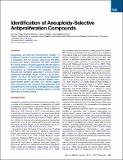| dc.contributor.author | Tang, Yun-Chi | |
| dc.contributor.author | Williams, Bret R. | |
| dc.contributor.author | Siegel, Jake J. | |
| dc.contributor.author | Amon, Angelika B | |
| dc.date.accessioned | 2013-12-10T21:56:24Z | |
| dc.date.available | 2013-12-10T21:56:24Z | |
| dc.date.issued | 2011-02 | |
| dc.date.submitted | 2010-11 | |
| dc.identifier.issn | 00928674 | |
| dc.identifier.uri | http://hdl.handle.net/1721.1/82911 | |
| dc.description.abstract | Aneuploidy, an incorrect chromosome number, is a hallmark of cancer. Compounds that cause lethality in aneuploid, but not euploid, cells could therefore provide new cancer therapies. We have identified the energy stress-inducing agent AICAR, the protein folding inhibitor 17-AAG, and the autophagy inhibitor chloroquine as exhibiting this property. AICAR induces p53-mediated apoptosis in primary mouse embryonic fibroblasts (MEFs) trisomic for chromosome 1, 13, 16, or 19. AICAR and 17-AAG, especially when combined, also show efficacy against aneuploid human cancer cell lines. Our results suggest that compounds that interfere with pathways that are essential for the survival of aneuploid cells could serve as a new treatment strategy against a broad spectrum of human tumors. | en_US |
| dc.description.sponsorship | Howard Hughes Medical Institute | en_US |
| dc.description.sponsorship | Massachusetts Institute of Technology. School of Science (Curt W. and Kathy Marble Cancer Research Fund) | en_US |
| dc.language.iso | en_US | |
| dc.publisher | Elsevier B.V. | en_US |
| dc.relation.isversionof | http://dx.doi.org/10.1016/j.cell.2011.01.017 | en_US |
| dc.rights | Article is made available in accordance with the publisher's policy and may be subject to US copyright law. Please refer to the publisher's site for terms of use. | en_US |
| dc.source | Elsevier Open Archive | en_US |
| dc.title | Identification of Aneuploidy-Selective Antiproliferation Compounds | en_US |
| dc.type | Article | en_US |
| dc.identifier.citation | Tang, Yun-Chi, Bret R. Williams, Jake J. Siegel, and Angelika Amon. “Identification of Aneuploidy-Selective Antiproliferation Compounds.” Cell 144, no. 4 (February 2011): 499-512. | en_US |
| dc.contributor.department | Massachusetts Institute of Technology. Department of Biology | en_US |
| dc.contributor.department | Koch Institute for Integrative Cancer Research at MIT | en_US |
| dc.contributor.mitauthor | Tang, Yun-Chi | en_US |
| dc.contributor.mitauthor | Williams, Bret R. | en_US |
| dc.contributor.mitauthor | Siegel, Jake J. | en_US |
| dc.contributor.mitauthor | Amon, Angelika B. | en_US |
| dc.relation.journal | Cell | en_US |
| dc.eprint.version | Final published version | en_US |
| dc.type.uri | http://purl.org/eprint/type/JournalArticle | en_US |
| eprint.status | http://purl.org/eprint/status/PeerReviewed | en_US |
| dspace.orderedauthors | Tang, Yun-Chi; Williams, Bret R.; Siegel, Jake J.; Amon, Angelika | en_US |
| dc.identifier.orcid | https://orcid.org/0000-0001-9837-0314 | |
| dc.identifier.orcid | https://orcid.org/0000-0003-0755-1369 | |
| mit.license | PUBLISHER_POLICY | en_US |
| mit.metadata.status | Complete | |
